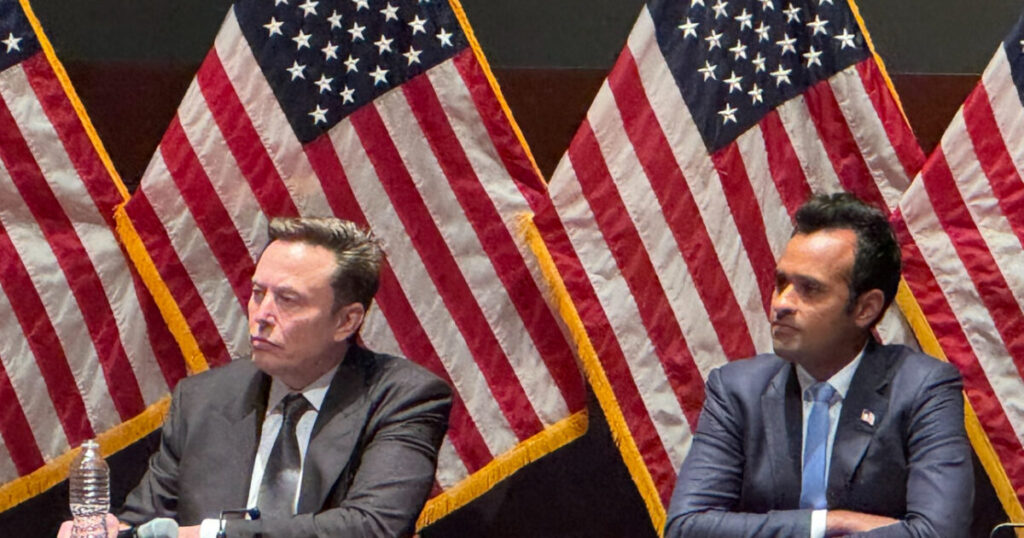On December 5, 2024, Elon Musk and Vivek Ramaswamy, co-heads of the Department of Government Efficiency (DOGE), engaged with lawmakers on Capitol Hill to address the ongoing discussions regarding a continuing resolution expected for a vote in the House and Senate before the Christmas recess. The former President Trump previously appointed Musk and Ramaswamy to lead DOGE, which aims to advise the government on structural reforms and foster an entrepreneurial mindset within governmental operations. Trump has asserted that their efforts could potentially save the government up to $2 trillion per year by eliminating wasteful spending. Ramaswamy emphasized the importance of the legislative review process, sharing his effort to read the extensive 1,547-page bill meant to fund the government through mid-March, suggesting that all members of Congress should do the same.
However, concerns emerged shortly after Ramaswamy’s post, particularly regarding the limited time Congress would have to review the bill before casting their votes. Musk echoed Ramaswamy’s sentiment by expressing his belief that the bill should not be passed, highlighting some contentious provisions within the resolution, including a proposed 40% pay increase for members of Congress, which sharply contrasted with the typical objectives of a “continuing resolution.” Musk’s objection raised questions about legislative accountability and the priorities reflected in government funding proposals. Representative Lauren Boebert of Colorado vocalized her strong opposition to the bill, reinforcing the notion that it favored Congressional pay raises over addressing the needs of American citizens.
In addition to the pay raise, concerns were raised regarding changes to health insurance for Congress members. Judicial Watch’s Tom Fitton pointed out that the continuing resolution would allow Congress members to opt out of the Affordable Care Act’s insurance exchanges, transitioning instead to the Federal Employees Health Benefits Program. This revelation drew criticism from commentators who noted the apparent double standards in the law’s application to lawmakers compared to average citizens, summoning the phrase “Rules for thee…” to highlight perceived hypocrisy. This narrative contributed to a broader discontent among conservatives, who viewed the resolution as prioritizing the interests of Congress members over those of everyday Americans.
The legislative landscape grew more contentious as conservative members of the GOP expressed their outrage over the increasing national deficit associated with the bipartisan continuing resolution. Representative Andy Biggs from Arizona openly criticized the leadership for caving to bipartisan pressures, stating that it perpetuated a “structural deficit” and exacerbated the already mounting national debt. This sentiment echoed across conservative factions within the GOP, who were alarmed by the trade-offs made in exchange for avoiding a government shutdown, suggesting that fundamental fiscal discipline and accountability were being sacrificed in the process.
Moreover, GOP Representative Eric Burlison described the legislation as “a total dumpster fire,” expressing frustration with the calculated decision-making of party leadership, specifically Speaker Mike Johnson. The recurrence of a “manufactured government shutdown crisis” as a means to push through an omnibus spending bill or continuing resolution further enraged several conservative members, including Representative Nancy Mace, who criticized her colleagues for their failure to address the issue year after year. This ongoing cycle of temporary funding measures without substantive reform was framed as a significant contributor to the growing federal debt.
Overall, the discourse surrounding the continuing resolution underscored a profound divide within the Republican Party between traditional fiscal conservatives and leadership willing to engage in bipartisan negotiations. Musk and Ramaswamy, as facilitators of DOGE, sought to introduce a fresh approach to government spending, yet the political realities of Congress highlighted ongoing tensions about prioritization, accountability, and the overarching goals of fiscal policy. As key figures continued to advocate for structural reform, the debate illustrated a broader concern about the implications of Congressional decisions on the financial well-being of American citizens, pointing to underlying frustrations within the party and the electorate regarding governance and accountability.

